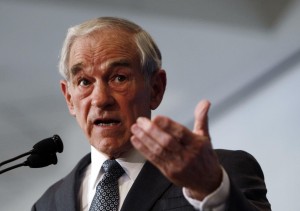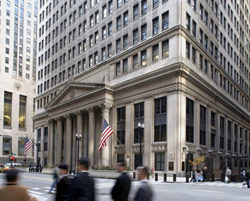Republican Party Platform Calls For A Return To The Gold Standard
| by Michael Locklear
 September 1, 2012 – One of the big stories of this presidential campaign season that has gone largely unnoticed may be the decision on the part of the Republican Party to introduce into its platform a call for a new commission to examine the possibilities of the United States returning to the gold standard. As the discussion on the economic problems created by the Fiat money system moves from just talk to real action, Ron Paul and the Tea Party have pushed their views into the mainstream ideas of the new Republican Party.
September 1, 2012 – One of the big stories of this presidential campaign season that has gone largely unnoticed may be the decision on the part of the Republican Party to introduce into its platform a call for a new commission to examine the possibilities of the United States returning to the gold standard. As the discussion on the economic problems created by the Fiat money system moves from just talk to real action, Ron Paul and the Tea Party have pushed their views into the mainstream ideas of the new Republican Party.
The Commission On the Role of Gold in the Domestic And International Monetary Systems
In 1971, a then Republican President Richard Nixon joined West Germany and Switzerland in abandoning the gold standard set up in 1944 by the establishment of the Bretton Woods system creating the era of the Fiat dollar. The next Republican president Ronald Reagan, 10 years later instructed his new Secretary Of The Treasury Donald Regan to form The Commission On the Role of Gold in the Domestic And International Monetary Systems. One of the commission members was Ronald E. Paul a Republican congressman from Texas who had been elected to the House of Representatives in 1976 after he was defeated in his first attempt in 1974 by Robert R. Casey who was the incumbent at the time. Paul has stated that he was inspired to enter politics in response to the “Nixon Shock” which refers to the decision by President Nixonon to leave the gold standard.
The late Sen. Jesse Helms, Republican of North Carolina, in 1980 was able to convince then President Jimmy Carter and his democratically controlled Congress to create a law calling for the creation of the gold commission in 1981. Since Carter was defeated by Pres. Reagan in the 1980 presidential election, it was Reagan who created the commission.
The commission was a beacon of hope for the gold-bugs of the time. The Gold Commission began its formal meetings in 1982. The Sec. of the Treasury built a commission heavy on the advocates of the monetary policies of Nobel Prize winner in economics, Milton Friedman. These were friends of the Federal Reserve. Representative Ron Paul and Lewis Lerhman, who is a widely known expert on economic and monetary policy, were the only pro-gold standard members on the commission. These men provided in response to the majority opinion of the commission a minority report which offered a detailed analysis of their position supported by the writings of Austrian legal expert Edwin Vieira and his views on the U.S. Dollar.
The Gold Commission majority report came out against a return to the gold standard. They did recommend the creation of gold and silver coins by the U.S. Mint which are still sold today as gold and silver eagles. Now Ron Paul and many gold standard advocates are in the news again as the 2012 Republican Party Platform calls for a new commission on the gold standard.
The Republican Party Platform Commission
In the new platform release this week the Republicans put forth their point of view. A section in the document entitled Inflation and the Federal Reserve they stated that:
A sound monetary policy is critical for maintaining a strong economy. Inflation diminishes the purchasing power of the dollar at home and abroad and is a hidden tax on the American people. Moreover, the inflation tax is regressive, punishes those who save, transfers wealth from Main Street to Wall Street, and has grave implications for seniors living on fixed incomes.
Because the Federal Reserve’s monetary policy actions affect any economic activity, those actions should be transparent. Moreover, The Fed’s important role as a lender of last resort should also be carried out in a more transparent manner. A free society demands that the sun shine on all elements of government. Therefore, the Republican Party will work to advance substantive legislation that brings transparency and accountability to the Federal Reserve, The Federal Open Market Committee, and the Fed’s dealings with foreign central banks. The first step to increasing transparency and accountability is through an annual audit of the Federal Reserve’s activities. Such an audit would need to be carefully implemented so that the Federal Reserve remains insulated from political pressure and so his decisions are based on sound economic principles and sound money rather than on political pressures for easy money and loose credit.
Determined to crush the double-digit Inflation that was part of the Carter Administration’s economic legacy, Pres. Reagan, shortly after his inauguration, established a commission to consider the feasibility of a metallic basis for U.S. currency. The commission advised against such a move. Now, three decades later, as we face the task of cleaning up the wreckage of the current Administration’s policies, we propose a similar commission to investigate possible ways to set a fixed value for the dollar.
Is A Return To The Gold Standard Likely?
Generally a political party’s national convention platform is like a party favor handed out in the heat of the excitement of the moment. Once a president is elected very little attention is given to the platform that was established at the convention.
This Republican Party’s platform may be an indication of the fear that Republican insiders have of The Tea Party and the voters who supported Ron Paul in his recent presidential bid. Since Romney has had substantial problems in wooing this side of the Republican electorate there is grave concern that they may sit out this election or move for a write-in vote for Ron Paul.
Despite what the media of the 24 hour news cycle might have us believe it is highly unlikely that the Republican establishment would support a return to the gold standard. It is more likely that rather than submit to the intimidation from the tea party and pro-gold advocates they will vote for Obama. There are an endless supply of meaningless gestures in American politics and the Republican Party’s Convention Platform regarding the return to the gold standard or at least a commission to investigate the possibility may be just the latest. Either way it has the gold bugs all excited.
Related Posts
Gold Prices Remain Volatile While Investors Wait for Jobs Numbers
October 2, 2012 - Gold prices increase slightly today over yesterday’s closing. Gold prices reached an annual peak yesterday when the price went up to $1791.20, its highest price since last November. The spot price today is around $1775. News of a stronger euro against the weakening dollar and a little market apprehension over forthcoming U. S. Job market numbers on Friday has investors in a bit of a cautious… more
Gold Rallies But Remains Volatile
October 1, 2012 - Positive moves in hedge fund buying and gains in bullion prices (bullion is showing the highest quarterly price increases in two years) pushed gold prices up dramatically today. Continued speculation about increased inflation resulting from recent monetary easing actions from the Federal Reserve pushed gold to a 10 month high. In an interview with CNBC, Charles Evans President of the Federal Reserve Bank of Chicago, said that… more
Dollar Strengthens Gold Retreats
September 28, 2012 - Gold prices retreated today from yesterday’s high as the dollar moves into a stronger position against numerous other currencies. Despite the slight setback gold still remains in a strong position to make its biggest increases in any quarter since 2010. Announcements this month for major central banks regarding continued monetary easing in order to shore up their economies will continue to push gold into positive territory. Earlier… more
Nervous Investors Continue To Push Gold Down
Due to weakness in the stock market and other commodities combined with continued profit-taking and a stronger dollar, has the spot price of gold down today by 1%. Gold is struggling as it tries to maintain its highs after the announcements by the European Central Bank United States Federal Reserve and the Bank of Japan, earlier this month. The expectation of continuing low long-term interest rates and fears of inflation along… more
